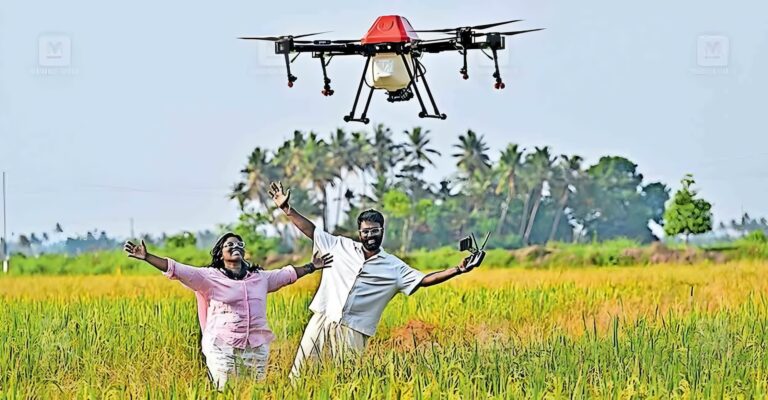The devastating Kerala floods of 2018 changed everything for Ambika Chandrasekharan, a Pokkali rice farmer from Alappuzha district. As floodwaters receded, they left behind severely damaged soil with depleted nutrients, causing massive crop yield losses that threatened her family’s livelihood.
Her son Devan Chandrasekharan, fresh out of aeronautical engineering graduation, witnessed his mother’s struggles firsthand. The traditional farming methods that had sustained generations were no longer effective in the post-flood landscape. This moment of crisis became the catalyst for innovation that would eventually transform Indian agriculture.
Instead of accepting defeat, Devan saw an opportunity to apply his engineering knowledge to solve real farming problems. He wondered whether farming could transition from traditional soil-based practices to a more data-driven approach. The answer came in the form of drones – aerial vehicles that could capture crop data, analyze it, and enable precise application of fertilizers and pesticides instead of the blanket methods farmers had relied on for decades.
In 2020, Devan joined forces with his sister Devika Chandrasekharan to establish Fuselage Innovations, an agritech startup that would revolutionize precision farming in India. The company name itself reflects their mission – derived from the central structure of an aircraft that coordinates all components, symbolizing their integrated approach to agricultural solutions.
The startup has developed two groundbreaking drones that work in perfect harmony. Nireeksh, equipped with multispectral sensors, conducts detailed crop monitoring and identifies problems like pests and nutrient deficiencies at early stages through plant mapping. After analysis, their second drone Fiya precisely sprays fertilizers and pesticides only on areas that need treatment, eliminating wasteful blanket applications
The results have been remarkable. Farmers using Fuselage’s technology report yield increases of 25-35 percent while reducing fertilizer and nutrient consumption by 75 percent. This efficiency has tripled farmers’ profits, making precision farming economically viable for Indian agriculture. The company currently has a monthly production capacity of 250 drones and has worked with over 3,500 farmers across seven states.
Recognition has followed innovation. Devan Chandrasekharan was featured in Forbes India’s prestigious 30 Under 30 list for 2025 in the agritech category. The startup has secured patents for its integrated drone technology and received the 80-IAC Tax Exemption Certificate from the Government of India, joining fewer than 200 startups nationwide to achieve this honor.
Fuselage Innovations has also attracted significant funding and grants, including a Rs 30 lakh innovation grant from IIMK Live and Cochin Shipyard Limited. The company has expanded internationally, with registered entities in Canada and the UK, and is exploring opportunities in the GCC and Africa. Their work has been recognized by organizations including UNDP, EY, Hitachi, and featured by Forbes without even applying.
The 14-member team plans to add 25 more employees this year as they scale operations globally. From Kerala’s flood-damaged farms to international markets, this mother-son story exemplifies how personal hardship can drive technological innovation that transforms entire industries. Ambika Chandrasekharan’s agricultural struggles didn’t just inspire her son – they sparked a revolution in Indian farming that promises to benefit thousands of farmers facing similar challenges.

